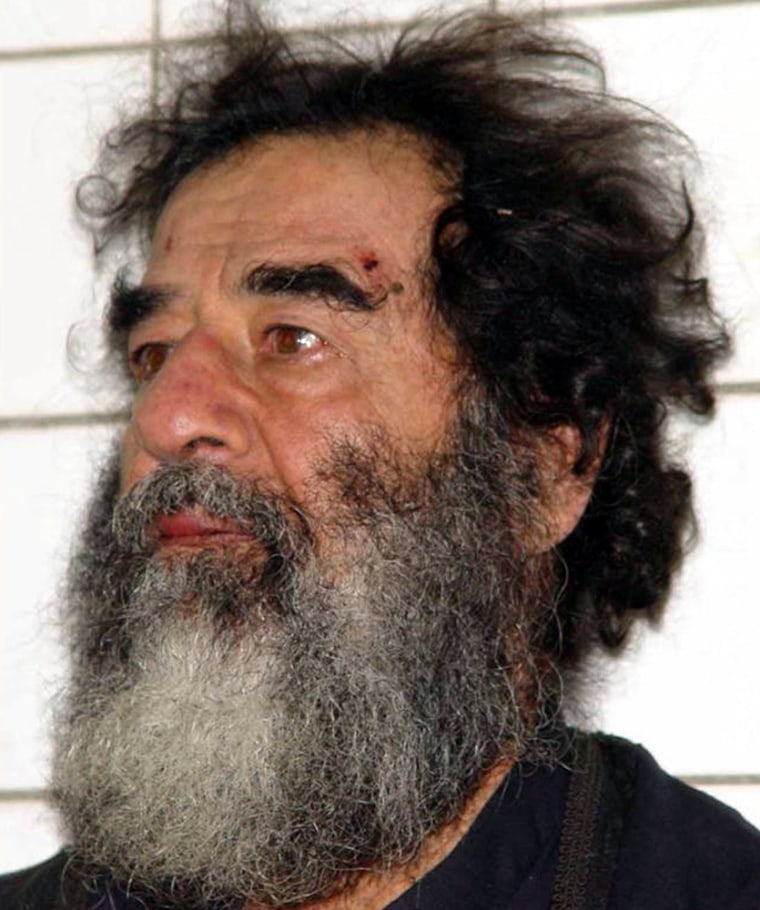An Iraqi justice official said he hopes to file criminal charges against Saddam Hussein this month, as control over the former dictator’s fate emerges as a test of Iraq’s sovereignty.
Salem Chalabi’s comments came amid intense speculation whether Saddam would be handed over by the time the U.S.-led occupation officially ends on June 30. The United States and the interim government have disagreed over those plans, and the dispute is being seen as an indicator of how much power independence government will have.
Saddam has been in U.S. custody in an undisclosed location since he was found last December.
“I suspect that there will be an arrest warrant filed not only against Saddam but also against the other high-ranking officials before June 30,” said Chalabi, the Iraqi official in charge of setting up a tribunal to charge members of the ousted regime.
“We have been working quite hard in the last few days on that, believe me,” Chalabi said.
The tribunal is expected to try Saddam for atrocities committed during his 23 years as president, including the deaths of some 300,000 people.
On Tuesday, interim Prime Minister Iyad Allawi said the former Iraqi president and other detainees would be transferred to Iraqi authorities in the coming two weeks. Allawi said Saddam would stand trial “as soon as possible” but gave no specific timeframe.
Bush cautious on Saddam handover
President Bush said Tuesday that the United States would turn over the former president, but he would not set a timetable, saying “appropriate security” must be in place first.
Neither the United States nor the new Iraqi government wants there “to be lax security and for Saddam Hussein to not stand trial,” Bush said in response to a reporter’s question at a news conference in the White House Rose Garden with Afghan President Hamid Karzai.
“I want to make sure that when sovereignty is transferred, Saddam Hussein stays in jail,” Bush told reporters.
The International Committee of the Red Cross has indicated that under international law, Saddam must be charged or released after the formal end of the occupation, since he was detained as a prisoner of war.
Interim President Ghazi al-Yawer said Bush himself was anxious to hand over Saddam.
“Even President Bush himself was asking me,” al-Yawer told reporters in Baghdad after returning from the G-8 summit in Sea Island, Ga. “The United States is very keen to hand over the ex-president to the Iraqi authorities.”
Al-Yawer cautioned that security precautions must exist in order for Iraq to be able to take custody.
“We must first make sure that we can maintain protection for his life until he goes to trial,” al-Yawer said. “We must make sure that the trial goes as a legal process, he has his own fair chance of defense and the government has its own chance.”
U.S. looking for ‘appropriate time’
Coalition spokesman Dan Senor told reporters Tuesday that the United States wanted Saddam tried by an Iraqi court and that talks were underway to determine how and when.
“I wouldn’t call them negotiations,” Senor said. “I would call them discussions. Both sides have an interest in handing over Saddam Hussein to the Iraqis. The only matter is when is the appropriate time. That is something we are discussing with the prime minister right now.”
A senior State Department official was more blunt in remarks to NBC News, saying the Iraqi tribunal was not ready.
“We’re sensitive to Iraqi desires to take custody of Saddam Hussein, and we’re working with them to find a way to do that that meets both legal and security requirements,” the official said in Washington on condition of anonymity. “But can it be done by June 30? I don’t know.”

U.S. officials have said they plan to continue to hold up to 5,000 prisoners deemed a threat to the coalition even after the restoration of Iraqi sovereignty at the end of this month. They say as many as 1,400 detainees will either be released or transferred to Iraqi authorities.
Chalabi, 41, is a nephew of the former Iraqi Governing Council member Ahmad Chalabi, who recently fell out with Washington. The 6-month-old Iraqi Special Tribunal, which Salem Chalabi is organizing, has struggled to put appropriate security safeguards in place.
War crimes experts have cautioned that as long as violence prevails in Iraq, the trial of Saddam and at least 100 others suspected of committing atrocities against the Iraqi people should wait — unless a foreign venue can be found.
Judges have refused to work for the tribunal after five potential candidates were killed since Saddam was toppled from power last year. Tens of millions of dollars have been spent on security alone.
Al-Yawer said that his government’s top priority would be regaining security in Iraq and rehabilitating Iraqi security institutions.
“But things do not happen overnight,” he said.